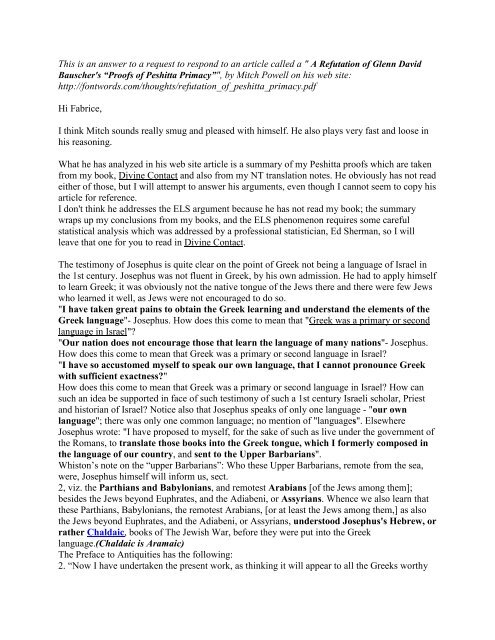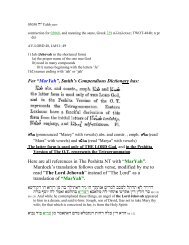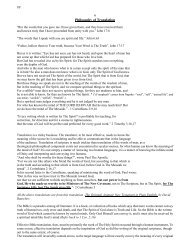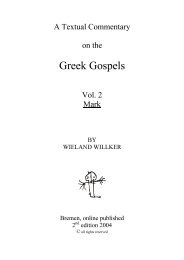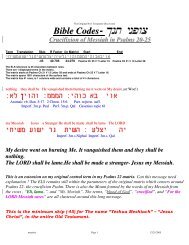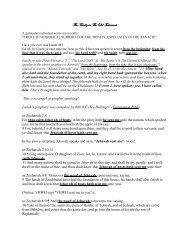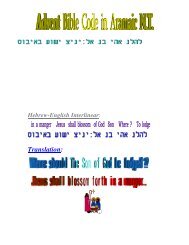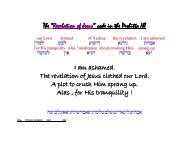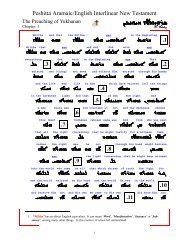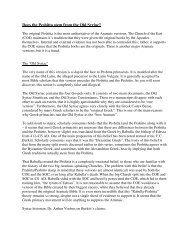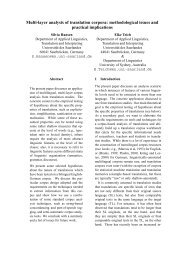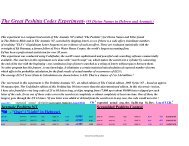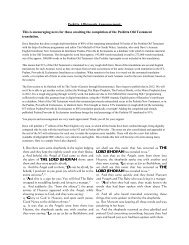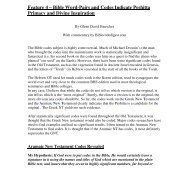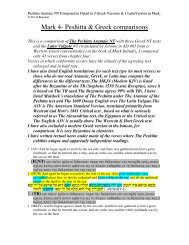Refuting a Greek Primacist - An Introduction - Aramaic New Testament
Refuting a Greek Primacist - An Introduction - Aramaic New Testament
Refuting a Greek Primacist - An Introduction - Aramaic New Testament
Create successful ePaper yourself
Turn your PDF publications into a flip-book with our unique Google optimized e-Paper software.
This is an answer to a request to respond to an article called a " A Refutation of Glenn David<br />
Bauscher's “Proofs of Peshitta Primacy”", by Mitch Powell on his web site:<br />
http://fontwords.com/thoughts/refutation_of_peshitta_primacy.pdf<br />
Hi Fabrice,<br />
I think Mitch sounds really smug and pleased with himself. He also plays very fast and loose in<br />
his reasoning.<br />
What he has analyzed in his web site article is a summary of my Peshitta proofs which are taken<br />
from my book, Divine Contact and also from my NT translation notes. He obviously has not read<br />
either of those, but I will attempt to answer his arguments, even though I cannot seem to copy his<br />
article for reference.<br />
I don't think he addresses the ELS argument because he has not read my book; the summary<br />
wraps up my conclusions from my books, and the ELS phenomenon requires some careful<br />
statistical analysis which was addressed by a professional statistician, Ed Sherman, so I will<br />
leave that one for you to read in Divine Contact.<br />
The testimony of Josephus is quite clear on the point of <strong>Greek</strong> not being a language of Israel in<br />
the 1st century. Josephus was not fluent in <strong>Greek</strong>, by his own admission. He had to apply himself<br />
to learn <strong>Greek</strong>; it was obviously not the native tongue of the Jews there and there were few Jews<br />
who learned it well, as Jews were not encouraged to do so.<br />
"I have taken great pains to obtain the <strong>Greek</strong> learning and understand the elements of the<br />
<strong>Greek</strong> language"- Josephus. How does this come to mean that "<strong>Greek</strong> was a primary or second<br />
language in Israel"?<br />
"Our nation does not encourage those that learn the language of many nations"- Josephus.<br />
How does this come to mean that <strong>Greek</strong> was a primary or second language in Israel?<br />
"I have so accustomed myself to speak our own language, that I cannot pronounce <strong>Greek</strong><br />
with sufficient exactness?"<br />
How does this come to mean that <strong>Greek</strong> was a primary or second language in Israel? How can<br />
such an idea be supported in face of such testimony of such a 1st century Israeli scholar, Priest<br />
and historian of Israel? Notice also that Josephus speaks of only one language - "our own<br />
language"; there was only one common language; no mention of "languages". Elsewhere<br />
Josephus wrote: "I have proposed to myself, for the sake of such as live under the government of<br />
the Romans, to translate those books into the <strong>Greek</strong> tongue, which I formerly composed in<br />
the language of our country, and sent to the Upper Barbarians".<br />
Whiston’s note on the “upper Barbarians”: Who these Upper Barbarians, remote from the sea,<br />
were, Josephus himself will inform us, sect.<br />
2, viz. the Parthians and Babylonians, and remotest Arabians [of the Jews among them];<br />
besides the Jews beyond Euphrates, and the Adiabeni, or Assyrians. Whence we also learn that<br />
these Parthians, Babylonians, the remotest Arabians, [or at least the Jews among them,] as also<br />
the Jews beyond Euphrates, and the Adiabeni, or Assyrians, understood Josephus's Hebrew, or<br />
rather Chaldaic, books of The Jewish War, before they were put into the <strong>Greek</strong><br />
language.(Chaldaic is <strong>Aramaic</strong>)<br />
The Preface to <strong>An</strong>tiquities has the following:<br />
2. “Now I have undertaken the present work, as thinking it will appear to all the <strong>Greek</strong>s worthy
of their study; for it will contain all our antiquities, and the constitution of our government, as<br />
interpreted out of the Hebrew Scriptures...I grew weary and went on slowly, it being a large<br />
subject, and a difficult thing to translate our history into a foreign, and to us unaccustomed<br />
language...”<br />
There were some Hellenists in Israel, but that very term demolishes the idea that all or most 1st<br />
century Jews in Israel spoke <strong>Greek</strong>. A Hellenist is by definition, "a <strong>Greek</strong> speaking Jew". If the<br />
common Christian view of 1st century language of Israel were correct, then all Jews in Israel<br />
were Hellenists! But the NT mentions the Hellenists as a separate group in Israel.<br />
Ac 6:1 <strong>An</strong>d in those days, when the number of the disciples was multiplied, there arose a<br />
murmuring of the Grecians against the Hebrews, because their widows were neglected<br />
in the daily ministration.<br />
Ac 9:29 <strong>An</strong>d he spake boldly in the name of the Lord Jesus, and disputed against the Grecians<br />
: but they went about to slay him.<br />
Ac 11:20 <strong>An</strong>d some of them were men of Cyprus and Cyrene, which, when they were come to<br />
<strong>An</strong>tioch, spake unto the Grecians , preaching the Lord Jesus.<br />
The genealogy problem in Mat. 1 is quite simple, really. Mark, my objector, says that the answer<br />
is that David is named twice, both in the 1st and second groups of names; he fails to mention that<br />
Josiah at the captivity of Babylon is also mentioned twice, in the second and in the 3rd group of<br />
names as an end point and starting point, as David is. By his method of counting, then the 3rd<br />
group from Josiah to Christ has 15 generations! Count 'em.<br />
There is no need for double counting any names .From Abraham to David by all accounts is 14<br />
generations; from David (starting with Solomon, the 1st after David, so as not to double count<br />
David) to Jeconiah at the captivity of Babylon is 14, and from Jeconiah (starting with Shealtiel,<br />
the 1st generation after Jeconiah, so as not to double count Jeconiah) to The Messiah is 14<br />
generations in the Peshitta, but 13 in the <strong>Greek</strong>. There is no way around this problem in the<br />
<strong>Greek</strong> text. If one counts a name doubly in the third set, then the same must be done in the 2nd,<br />
and that gives 14, 14 and 15 generations, making the 3 rd number incorrect, as if Matthew could<br />
not even count correctly. That's a fine introduction to the Divinely inspired <strong>New</strong> <strong>Testament</strong>!<br />
This is simply fudging, which is a polite word for cheating. The problem is not in the second set<br />
of generations; it is in the 3rd set, and no matter how you slice it, the <strong>Greek</strong> text cannot be<br />
correct in its reckoning of Joseph the husband of Mary in the 3rd set of generations. The <strong>Aramaic</strong><br />
term "gabra" can refer to a father, and this would mean that the Joseph in 1:16 is Mary's father,<br />
not her husband, and makes Joseph son of Jacob, the 12th generation from Jeconiah: Shealtiel,<br />
Zerubbabel,Abiud,...Jacob, Joseph, Mary, Jesus. This also means that this is Mary's genealogy,<br />
not her husband's, which also means that Luke's genealogy in chapter 3 is Joseph's; this makes<br />
perfect sense when you study it, as Luke 3:23 makes clear-"Jesus, supposed to be Bar (son of)<br />
Joseph, Bar Heli, Bar Matthat,..." Compare the names in this genealogy with Matthew 1:1-17,<br />
they cannot be the same genealogy, but Matthew 1 in the <strong>Greek</strong> text has to be Joseph's, the<br />
husband of Mary, and not Mary's genealogy, whereas the Luke 3 genealogy is also plainly<br />
Joseph's the husband of Mary! Many have interpreted the Luke 3 genealogy to be Mary’s, when<br />
she is nowhere mentioned in it, and Matthew 1:1-17 to be Joseph’s, Mary’s husband, where her<br />
name is found.
The Peshitta clears up both discrepancies, the numbers of generations and whose genealogies are<br />
recorded in Matthew 1 and in Luke 3. The commentators are generally wrong on these points, as<br />
they are relying on a flawed NT in <strong>Greek</strong>, which is merely a translation of the <strong>Aramaic</strong> Peshitta,<br />
the original NT!<br />
I cannot take up my time to refuting more of this guy's idiocy. The above demonstrates how<br />
vapid and ridiculous his arguments are.<br />
Thanks for sending this. I will use this response on my new web site and include it in future<br />
editions of my books as an appendix.<br />
Burkta saggyath b'Maran w'Pruqan<br />
Many blessings in our Lord and Savior,<br />
Dave<br />
1 biblov genesewv ihsou cristou uiou dauid uiou abraam<br />
2 abraam egennhsen ton isaak isaak de egennhsen ton iakwb iakwb<br />
de egennhsen ton ioudan kai touv adelfouv autou<br />
3 ioudav de egennhsen ton farev kai ton zara ek thv yamar farev<br />
de egennhsen ton esrwm esrwm de egennhsen ton aram<br />
4 aram de egennhsen ton aminadab aminadab de egennhsen ton<br />
naasswn naasswn de egennhsen ton salmwn<br />
5 salmwn de egennhsen ton booz ek thv racab booz de egennhsen ton<br />
wbhd ek thv rouy wbhd de egennhsen ton iessai<br />
6 iessai de egennhsen ton dauid14 ton basilea dauid dauid de o basileuv<br />
egennhsen ton solomwna ek thv tou ouriou<br />
7 solomwn de egennhsen ton roboam roboam de egennhsen ton abia<br />
abia de egennhsen ton asa<br />
8 asa de egennhsen ton iwsafat iwsafat de egennhsen ton iwram<br />
iwram de egennhsen ton ozian<br />
9 oziav de egennhsen ton iwayam iwayam de egennhsen ton acaz acaz<br />
de egennhsen ton ezekian<br />
10 ezekiav de egennhsen ton manassh manasshv de egennhsen ton<br />
amwn amwn de egennhsen ton iwsian<br />
11 iwsiav iwsiav de egennhsen ton ieconian14 kai touv adelfouv autou epi<br />
thv metoikesiav babulwnov
12 meta de thn metoikesian babulwnov ieconiav egennhsen ton<br />
salayihl salayihl de egennhsen ton zorobabel<br />
13 zorobabel de egennhsen ton abioud abioud de egennhsen ton<br />
eliakeim eliakeim de egennhsen ton azwr<br />
14 azwr de egennhsen ton sadwk sadwk de egennhsen ton aceim<br />
aceim de egennhsen ton elioud<br />
15 elioud de egennhsen ton eleazar eleazar de egennhsen ton matyan<br />
matyan de egennhsen ton iakwb<br />
16 iakwb de egennhsen ton iwshf ton andra mariav ex hv egennhyh<br />
ihsouv o legomenov cristov 13<br />
17 pasai oun ai geneai apo abraam ewv dauid geneai dekatessarev<br />
kai apo dauid ewv thv metoikesiav babulwnov geneai<br />
dekatessarev kai apo thv metoikesiav babulwnov ewv tou<br />
cristou geneai dekatessarev<br />
Two observations are significant from the above <strong>Greek</strong> genealogy in Matthew chapter 1:<br />
1. The number of generations in the three sets of names delineated in v. 17 are, 14, 14 & 13<br />
when counting the names in each set. The text of v.17 states that the number of<br />
generations in each are 14,14 & 14. This presents a mathematical problem not easily<br />
dispatched, which mitigates the credibility of the <strong>Greek</strong> text as we have it.<br />
2. The <strong>Greek</strong> text presents this as Joseph’s – (Mary’s husband) genealogy. This is very<br />
different from the genealogy of Luke 3:23-38, which is also presented as Joseph’s.<br />
The Peshitta NT presents a compelling solution to both of the above problems.<br />
In verse 16 the Peshitta has: axysm arqtmd ewsy dlyta hnmd Myrmd hrbg Powyl dlwa bwqey<br />
Yaqov begot Yoseph gavrah of Maryam, from whom was born Yeshua, who is called The Messiah.<br />
“Gavrah” has a wide range of applications in its meaning: Man, hero, mighty man, husband, authority, master,<br />
guardian. It is applied to single men, married men, fathers, young men, & old men. Context would normally<br />
determine the specific application. If the <strong>Greek</strong> is a translation of the Peshitta, which I believe I have<br />
demonstrated in my notes in my translation of The Peshitta NT and in the book, Divine Contact, then the <strong>Greek</strong><br />
translator appears to have mistaken gavrah as andra andra (husband), when “Master” or “Authority” as applied to a<br />
father, was probably meant.
Paul Younan, a native <strong>Aramaic</strong> speaker from Lebanon and deacon of the Church of the East in Chicago, has written<br />
the following on this subject:<br />
Use of 0rbg 0rbg in Classical and Contemporary <strong>Aramaic</strong> Thought<br />
Use of 0rbg in Classical and Contemporary <strong>Aramaic</strong> Thought<br />
Paul David Younan.<br />
Abstract: In this article an attempt is made to throw some light on 0rbg in relation to the varied<br />
usage of the term in Classical and Contemporary <strong>Aramaic</strong>, with particular attention paid to the<br />
impact on the traditional understanding of the lineage of Christ as recorded in the Gospels.<br />
INTRODUCTION<br />
Almost since they were first penned down, historian and theologian alike have attempted to<br />
reconcile the discrepancies between the genealogical record of Jesus as recorded by Matthew and<br />
Luke.<br />
Traditional Understanding of Matthew's Genealogical Record:<br />
First Series Second Series Third Series<br />
1. Abraham 1. Solomon 1. Salathiel<br />
2. Isaac 2. Roboam 2. Zerubabel<br />
3. Jacob 3. Abia 3. Abiud<br />
4. Judas 4. Asa 4. Eliachim<br />
5. Phares 5. Josaphat 5. Azor<br />
6. Esron 6. Joram 6. Sadoe<br />
7. Aram 7. Ozias 7. Achim<br />
8. Aminadab 8. Joatham 8. Eliud<br />
9. Naasson 9. Achaz 9. Eleazar<br />
10. Salmon 10. Ezechias 10. Mathan<br />
11. Booz 11. Manasses 11. Jacob<br />
12. Obed 12. Amon 12. Joseph
(husband of<br />
Mary)<br />
13. Jesse 13. Josias 13. Jesus<br />
14. David 14. Jechonias<br />
Traditional Understanding of Luke's Genealogical Record:<br />
First Series Second Series Third Series<br />
1. Abraham 1. Nathan 1. Salathiel<br />
2. Isaac 2. Methatha 2. Zerubabel<br />
3. Jacob 3. Menna 3. Reza<br />
4. Judas 4. Melea 4. Joanna<br />
5. Phares 5. Eliakim 5. Juda<br />
6. Esron 6. Jona 6. Joseph<br />
7. Aram 7. Joseph 7. Semei<br />
8. Aminadab 8. Judas 8. Mathathias<br />
9. Naasson 9. Simeon 9. Mathath<br />
10. Salmon 10. Levi 10. Nagge<br />
11. Booz 11. Mathat 11. Hesli<br />
12. Obed 12. Jorim 12. Nahum<br />
13. Jesse 13. Eleazar 13. Amos<br />
14. David 14. Joshua 14. Mathathias<br />
15. Her 15. Joseph<br />
16. Helmadan 16. Janne<br />
17. Cosan 17. Melchi<br />
18. Addi 18. Levi<br />
19. Melchi 19. Mathat<br />
20. Neri 20. Heli<br />
21. Joseph<br />
(husband of<br />
Mary)<br />
22. Jesus<br />
Church fathers, whether Augustine and Ambrose in the West, or Eshoa-Dad of Merv and Bar-<br />
Hebreaus in the East, alike struggled to explain in a satisfactory way the contradictions and<br />
questions raised by a plain reading of these texts. None of them were able to successfully<br />
demonstrate their conclusions, answer the myriad of questions raised by their own conclusions,<br />
or even agree with one other.
In post-modern secular thought, the attempt has been made to discredit the accounts on the basis<br />
that the authors of the Gospels in question were making exaggerated claims in order to establish<br />
a non-existent lineage for Christ.<br />
In reality, there are very problematic issues raised by a plain reading of these texts - especially<br />
within the confines of the current academically accepted framework, that the Gospels of<br />
Matthew and Luke were first penned in <strong>Greek</strong>.<br />
It is only when we refer to the <strong>Aramaic</strong> story, in an <strong>Aramaic</strong> psyche, will we be able to finally<br />
answer the puzzling questions raised by the plain reading of the text:<br />
Why are there only list 13 generations listed from the Captivity of Babylon to Jesus, in<br />
Matthew's account? Doesn’t Matthew say there should be 14 generations?<br />
Why does Luke list 20 generations in the second series, and 22 in the third? If this is the same<br />
Joseph, shouldn't there be 14 generations in the second and third series of Luke as well?<br />
Why do the lineages of Joseph, the husband of Mary, almost completely differ in the two<br />
accounts?<br />
How can Jesus be the Son of David, if Mary is not a daughter of David?<br />
If both St. Matthew and St. Luke give the genealogy of St. Joseph, the one through the lineage<br />
of Solomon, the other through that of Nathan - how can the lines converge in Joseph? How<br />
can Joseph claim descent from King David, through both Nathan and Solomon?<br />
As with most problems that appear complex on the surface, this one has a very simple answer.<br />
The answer lies in the <strong>Aramaic</strong> original of the Gospel of Matthew, according to the Peshitta<br />
version.<br />
BACKGROUND OF 0rbg<br />
0rbg (pronounced Gaw-ra) is a noun in the Emphatic state derived from the ancient Semitic<br />
verb rbg (pronounced Ga-bar) - meaning "To be strong, brave, manly, courageous." This term<br />
is well attested to in the other major Semitic languages - rbg (pronounced Gaw-bar) in<br />
rbg<br />
Hebrew and Ja-br in Arabic. The general meaning of the Emphatic noun 0rbg is "Man."
As used in Matthew 1:16, the word is hrbg which is the Possessive Pronominal form of<br />
0rbg , meaning "Her 'Gab-ra.'"<br />
Contextual Usage of 0rbg in the <strong>Aramaic</strong> <strong>New</strong> <strong>Testament</strong><br />
Although mainly used to mean ‘man’ in a generic sense, the term can also mean ‘husband’<br />
depending on the context<br />
Why is it that sometimes the general meaning of ‘man’ is increased in specificity, depending on<br />
context, to mean ‘husband?’ For no more reason than saying - ‘I now pronounce you man and
wife" can also be said "I now pronounce you husband and wife." Since a husband is merely a<br />
more ‘specific’ type of ‘man’, this equation of terminology is quite acceptable, even in English.<br />
The question then arises - can the term, when used in proper context, also mean ‘Father?’<br />
I believe it can be demonstrated from the Gospels that all three shades of meaning are attested to<br />
- depending on context.<br />
Verses in the Gospels where 0rbg is used to mean the generic ‘man’, although by no means<br />
an exhaustive list, include:<br />
Matthew 7:24<br />
Matthew 7:26<br />
Matthew 8:9<br />
Matthew 9:9<br />
Please reference the Concordance at www.peshitta.org for a more complete listing for this word.<br />
Some examples of the contextual variant ‘husband’ include:<br />
Matthew 19:5<br />
Matthew 19:10<br />
Mark 10:2<br />
1 Corinthians 7:14<br />
1 Corinthians 7:16<br />
2 Corinthians 11:2<br />
Ephesians 5:23.<br />
Finally, the contextual variant ‘father’ can be read in:<br />
Matthew 7:9<br />
Matthew 21:28<br />
Matthew 22:2<br />
and, arguably, Matthew 1:16.<br />
Since the subject matter of this thesis attempts to reconcile the two accounts of Jesus’ lineage,<br />
let’s have a closer look at Matthew 1:16, and a related verse - Matthew 1:19, in the <strong>Aramaic</strong> of<br />
the Peshitta.<br />
The <strong>Aramaic</strong> reading in the Peshitta version is:<br />
MATTHEW 1:16 & 1:19
Myrmd hrbg Pswyl dwl0 Bwq9y<br />
The verse reads: "Jacob fathered Yoseph, the hrbg of Maryam." The word used here, in verse<br />
16, is 0rbg with a 3rd-person feminine pronominal possessive suffix of h (i.e., ‘her Gaw-<br />
ra.’)<br />
This word has traditionally been translated ‘husband’, however, the main Semitic term for<br />
‘Husband’, is f9b ("Ba’la", or, hl9b for ‘Her husband.) Examples of this word can be<br />
found in:<br />
Matthew 1:19 (Here “Joseph” is called hleb - ‘her husband”.<strong>Greek</strong> has <strong>An</strong>hr, the same used in v.16)<br />
Mark 10:12<br />
Luke 2:36<br />
John 4:16-18<br />
Romans 7:2-3<br />
1 Corinthians 7:4, 7:10, 7:13, 7:16, 7:39<br />
Ephesians 5:33<br />
1 Timothy 3:2<br />
Titus 1:6.<br />
Why would Matthew use two different terms, in such a short span of writing (3 verses - 1:16 to<br />
1:19), to refer to Maryam’s ‘husband’, Yoseph?<br />
The fact is, he had to distinguish between two different people named Joseph - Matthew is not<br />
referring to Mary’s husband in verse 16 at all, but rather her father!<br />
Depending on context, it has been shown that 0rbg can mean ‘man, husband or father.’ The<br />
usage in verse 16 would demand that we translate 0rbg as ‘father’, rather than 'husband', since<br />
the context is a genealogy. Verses 18 & 19, however, would demand that we associate that<br />
Joseph with her ‘husband’, since the context is that of marriage.<br />
Matthew, then, is recording the genealogy of Mary, whereas Luke is recording that of<br />
Joseph. Which would be exactly opposite of the currently accepted academic line - that Luke<br />
recorded Mary’s lineage while Matthew recorded that of Joseph.<br />
That would give us 14 generation in the third series of Matthew. It would also explain why Luke<br />
has 20 generations in the 2nd series and 22 generations in the 3rd series - i.e., Joseph's lineage<br />
did not break out cleanly in 14-generation groupings, except for the first series. Since Matthew<br />
is giving the line of Mary, only her lineage would be required to break out evenly in 14generation<br />
groupings. That would also explain why the names are completely different in both
the 2nd and 3rd series between the accounts in Matthew and in Luke. It also demonstrates that<br />
both Mary and Joseph were descendents of King David - each through a separate line!<br />
A valid question is - 'Isn't it a fact that lineages generally exclude females?'<br />
The answer to that, generally, is yes. However, the problem is that Mary is the only real human<br />
parent that Jesus had. Jesus was the only person in history who had no human father - whose<br />
previous generation included only one person. So in order to count 14 generations - Mary must<br />
be included, even though it would introduce a female in the lineage. In order to demonstrate that<br />
Jesus is the Son of David, Mary must be demonstrated to descend from David's house!<br />
Here is a revised view of the Genealogical Record, according to a more proper understanding of<br />
<strong>Aramaic</strong> Matthew:<br />
First Series Second Series Third Series<br />
1. Abraham 1. Solomon 1. Salathiel<br />
2. Isaac 2. Roboam 2. Zerubabel<br />
3. Jacob 3. Abia 3. Abiud<br />
4. Judas 4. Asa 4. Eliachim<br />
5. Phares 5. Josaphat 5. Azor<br />
6. Esron 6. Joram 6. Sadoe<br />
7. Aram 7. Ozias 7. Achim<br />
8. Aminadab 8. Joatham 8. Eliud<br />
9. Naasson 9. Achaz 9. Eleazar<br />
10. Salmon 10. Ezechias 10. Mathan<br />
11. Booz 11. Manasses 11. Jacob<br />
12. Obed 12. Amon<br />
12. Joseph<br />
(father of<br />
Mary)<br />
13. Jesse 13. Josias 13. Mary<br />
14. David 14. Jechonias 14. Jesus<br />
THE GREEK MISTRANSLATION<br />
Since we know from Patristic writing that Matthew wrote his Gospel in the ‘Hebrew Dialect’ of<br />
<strong>Aramaic</strong> (Judean <strong>Aramaic</strong>), and that "everyone" translated it into <strong>Greek</strong> "as best they could" - it<br />
then follows that the <strong>Greek</strong>s mistranslated this term as ‘husband’, instead of the more proper<br />
contextual variant, ‘father.’
In <strong>Greek</strong>, the words for ‘husband’, ajnhvr (<strong>An</strong>er), and ‘father’ pathvr (Pater) are<br />
completely different. It is impossible for an <strong>Aramaic</strong> translator of a <strong>Greek</strong> document to confuse<br />
the two - but it is very easy for a <strong>Greek</strong> translator of an <strong>Aramaic</strong> original to mistake the<br />
contextual variances in the single term 0rbg<br />
THE OLD SYRIAC<br />
According to the modern academically accepted framework, the Peshitta is a revision of the Old<br />
Syriac - which, in turn, is a translation from the <strong>Greek</strong>.<br />
Since we have already demonstrated that the Church Fathers admitted that Matthew wrote in<br />
<strong>Aramaic</strong>, and the <strong>Greek</strong> versions are nothing more than translations - one naturally wonders, how<br />
does the "Old Syriac", and in particular, the Cureton manuscript read?<br />
Once again, the Old Syriac shows itself to be a fraud and a translation directly from the <strong>Greek</strong>.<br />
For Matthew 1:16, it reads:<br />
hl twh 0rykmd Pswy<br />
In English - "Joseph, to whom she was betrothed"<br />
Not surprisingly, it is caught red-handed because it also preserves the original Peshitta reading of<br />
hl9b in verse 19!<br />
The Peshitta is the only <strong>Aramaic</strong> version that preserved the original reading. The <strong>Greek</strong> versions<br />
were based on the Peshitta, and the "Old Syriac" is an imposter translated from the <strong>Greek</strong> -<br />
AFTER the mistranslation had crept into the <strong>Greek</strong> translations.<br />
THE MEDIEVAL HEBREW MANUSCRIPTS<br />
Dr. James Trimm, of the Society for the Advancement of Nazarene Judaism, has made use of<br />
three medieval manuscripts of Matthew in the Hebrew tongue, known as the Shem Tob (1300's),<br />
DuTillet and Munster versions.<br />
Regarding the age of the earliest manuscript witness to these versions of Matthew, and their<br />
similarity, Dr. Trimm states:<br />
"...one surfaced in the 1300's and the other two in the 1500's.<br />
Shem Tob (1300's) differs the most, while DuTillet and Munster are very similar. However<br />
there are many readings where they all agree together against all other versions (such as in<br />
Mt. 1:1). Shem Tob has many obvious layers of corruption which explains its substantial<br />
variances.
I believe they originate from the original Hebrew of Matthew. All three came out of the<br />
Jewish community." (post on the www.peshitta.org discussion forum, dated July 14, 2001.)<br />
But, according to all three medieval versions of the Hebrew Matthew, the genealogy of Jesus, is<br />
as follows:<br />
First Series Second Series Third Series<br />
1. Abraham 1. Solomon 1. Salathiel<br />
2. Isaac 2. Roboam 2. Zerubabel<br />
3. Jacob 3. Abia 3. Abiud<br />
4. Judas 4. Asa 4. Avner<br />
5. Phares 5. Josaphat 5. Eliachim<br />
6. Esron 6. Joram 6. Azor<br />
7. Aram 7. Ozias 7. Sadoe<br />
8. Aminadab 8. Joatham 8. Achim<br />
9. Naasson 9. Achaz 9. Eliud<br />
10. Salmon 10. Ezechias 10. Eleazar<br />
11. Booz 11. Manasses 11. Mathan<br />
12. Obed 12. Amon 12. Jacob<br />
13. Jesse 13. Josias<br />
13. Joseph<br />
(husband of<br />
Mary)<br />
14. David 14. Jechonias 14. Jesus<br />
These Hebrew versions of Matthew show themselves to be frauds and mere medieval<br />
translations from the <strong>Greek</strong> and Latin manuscripts since, like their sources, they make the claim<br />
that the Joseph mentioned in the third series is the 'husband' of Maryam.<br />
Secondly, to make up for the obviously lacking 14th generation in the third series, they make up<br />
a new name (Avner) and insert it in between Abiud and Eliachim.<br />
Thirdly, this solution is superficial in that it seemingly only resolves the one issue regarding the<br />
14 generations. But what of all the differences between the names in Matthew and Luke? <strong>An</strong>d<br />
the number of generations in the 2nd and 3rd series of Luke? Or, the problem of exactly which<br />
son of David Joseph was supposedly descended from?<br />
I believe it can be demonstrated with this, and other, examples that Hebrew Matthew never<br />
existed - that it was in <strong>Aramaic</strong> that Matthew wrote his Gospel, and that by 'the Hebrew dialect'<br />
Judean <strong>Aramaic</strong> was meant.
What can history and tradition and tell us about the original language of Matthew - was it<br />
<strong>Aramaic</strong> or Hebrew?<br />
Specialists of the <strong>Aramaic</strong> language have analyzed closely this topic, and have come to<br />
distinguish various <strong>Aramaic</strong> dialects in the contemporary Palestine of Jesus as testified to by<br />
inscriptions thus discovered.<br />
Based on this data, they are able to distinguish seven dialects that were shared by seven different<br />
localities in this small region:<br />
<strong>Aramaic</strong> of Judea.<br />
<strong>Aramaic</strong> of Southern Judea.<br />
<strong>Aramaic</strong> of Samaria.<br />
<strong>Aramaic</strong> of Galilee.<br />
<strong>Aramaic</strong> from beyond Jordan.<br />
<strong>Aramaic</strong> from Damascus.<br />
<strong>Aramaic</strong> spoken in the Orontes River Basin of Syria.<br />
The <strong>Aramaic</strong> of Judea was called the 'Hebrew dialect.' It was different from, yet mutually<br />
comprehensible with, the <strong>Aramaic</strong> of Galilee (the dialect that Jesus spoke.) This is one reason<br />
why Peter's (Keepa's) "speech" (dialect) was recognized during the trial, which happened to be in<br />
Judea. Peter spoke Galilean <strong>Aramaic</strong>, whereas the inhabitants of Judea spoke a slightly different<br />
dialect. It was for these inhabitants of Judea that Matthew wrote his Gospel.<br />
Papias says that Matthew wrote the Logia in the Hebrew (Hebraidi) language; St. Irenæus and<br />
Eusebius maintain that he wrote his gospel for the Hebrews in their national language, and the<br />
same assertion is found in several ancient witnesses. But, in the time of Christ, the national<br />
language of the Jews was <strong>Aramaic</strong>, and when, in the <strong>New</strong> <strong>Testament</strong>, there is mention of the<br />
Hebrew language (Hebrais dialektos), it is <strong>Aramaic</strong> that is implied.<br />
Hence, the aforementioned Church Father may have been alluding to <strong>Aramaic</strong> and not to<br />
Hebrew. Besides, as they assert, the Apostle Matthew wrote his Gospel to help popular teaching<br />
and evangelization. To be understood by his readers who spoke <strong>Aramaic</strong>, he would have had to<br />
reproduce the original catechesis in this language, and it cannot be imagined why, or for whom,<br />
he should have taken the trouble to write it in Hebrew, when it would have had to be translated<br />
afterwards into <strong>Aramaic</strong> for use by the common people - who no longer understood the old<br />
language.. Moreover, Eusebius (Hist. eccl., III, xxiv, 6) tells us that the Gospel of Matthew was a<br />
reproduction of his preaching, and this we know, was in <strong>Aramaic</strong>.
Even if Matthew recorded the preaching of Jesus (which was in <strong>Aramaic</strong>) in Hebrew (a<br />
ridiculous assumption) - then the Hebrew would be, as the <strong>Greek</strong>, second-hand<br />
information.<br />
NEO-ARAMAIC USAGE OF 0rbg<br />
The term 0rbg is still used today in modern literature. However, as in all languages,<br />
sometimes the way a word is spelled changes over time. For instance, we no longer spell ‘shop’<br />
the way it was spelled centuries ago - ‘Shoppe.’ Many times, simple variances in spelling arise.<br />
In Modern Eastern, or neo-<strong>Aramaic</strong>, the word 0rbg can still be spelled the same way, although<br />
a variant using the spelling 0rwg. is attested to. Sometimes the Beth B is spelled with a Waw<br />
w in Eastern <strong>Aramaic</strong>, according to the vocalization rules of Qushaya and Rukakha (c.f.,<br />
Yukhanan Bar-Zubi’s Grammar, 13th Century or www.assyrianlanguage.com under ‘Rules for<br />
Aspiration’)<br />
Using Oraham’s Dictionary of the Assyrian Language, we can see direct witness that 0rbg<br />
means both ‘man’ and ‘husband.’<br />
<strong>An</strong>d, that the new variant in spelling is attested to by this dictionary:
According to the Way International's Concordance to the Peshitta, the term can mean 'man' or<br />
'husband.'<br />
In a book called 'Dishna d'Saybuthi, shown below, we see a short story using the new variant to<br />
mean 'elders of a household:'
In the above scan, the context of the short story is a description of a holiday the Assyrians of the<br />
Hakkari mountains celebrated during "Khad b’Nisan" (1st of Nisan (April), which is the<br />
Assyrian <strong>New</strong> Year.)<br />
The title is - "The Second Festival/Celebration of the First of Nisan." During this "Festival",<br />
which coincided with the "first rain" in spring, the story states that "all the Fyb Ynb<br />
(residents of the house/the entire houshold), both 0rw9zw 0rwg (elders and young), departed<br />
from the home and allowed the rain to fall upon them, and getting soaked - they would begin to<br />
sing- ‘The drops of Nisan, the drops of Nisan.....may Nisan be blessed!"
This article proves that the term 0rwg can mean ‘elders of a household’, since it mentions them<br />
alongside the 0rw9z, "young." This meaning, "elders of a household", is not attested to in the<br />
dictionaries referenced above - just as the meaning "father" is not attested to.<br />
Finally, and the most powerful example - in Kinnara d'Rookha (the Harp of the Spirit), a<br />
quarterly published by the Archbishopric of the Church of the East in Baghdad, Iraq, Vol. 1 No3,<br />
1999, the following fable is written:
The above scan contains a Fable called "The Fable of the Lion, the Fox and the Son of a<br />
Merchant." The heading, the most important part of this example, contains the following<br />
introduction, which, when translated, means:<br />
Nyrm0 - ‘it is said’<br />
0rbgd - ‘that a father’
$n0 - ‘a man’<br />
0rgt -‘who is a merchant’<br />
rd4 - ‘sent’<br />
hrbl - ‘his son’<br />
Frwg0tb - ‘to go trade’<br />
This example is extraordinary in that it demonstrates the contextual usage of 0rbg in a sense<br />
that can only mean ‘father.’ It cannot be translated as ‘man’, since, the word following<br />
immediately after it is $n0 - ‘a man’ (yet another <strong>Aramaic</strong> term that means ‘man’). So to<br />
translate 0rbg as 'man' here would make it redundant with $n0.<br />
I have also highlighted, later on in the short story, where the son is called 0grt rb "Bar-<br />
Tagara", or "son of the merchant." Additionally, the article also uses the word Yhwb0 - "his<br />
father."<br />
So this example makes a very clear case for translating 0rbg as "father", if it is drawn from the<br />
proper context.<br />
OPINIONS OF SCHOLARS<br />
When I started researching this topic, I wanted to check the thesis with a number of professors<br />
who work in the field of Syriac/<strong>Aramaic</strong>, at some of the world's most prestigious universities.<br />
Since I do not (yet) have permission to quote them by name, I will only summarize their<br />
responses to give you an idea of the varying opinions on this topic.<br />
In response to the question, 'Have you ever seen an instance where 0rbg can be translated<br />
'father' or 'head of household' in English?'<br />
They wrote:
"Dear Paul: Thanks for the question..... it doesn't seem to be in any of the major Syriac<br />
lexicons (I checked Thomas Odo, Qardahi, Manna, Bar-Bahloul, Payne Smith, Brockelmann,<br />
Brun, and Costaz! Nor is it in the two dictionaries I have to hand of Turoyo [Ritter] and<br />
Sureth [Maclean]).<br />
As in many languages, I am sure there must be places in Syriac literature where gabra / gabro<br />
could be understood to mean<br />
something more inclusive than just man/ husband, and where it may have the sense you are<br />
looking for. (After all, the <strong>New</strong><br />
<strong>Testament</strong> passages Ephesians 5.23 and 1 Cor 11.3 get you pretty close to this.)<br />
If you find any examples do let me know!"<br />
"Dear Paul: GBRA is from an old Semitic word found in the Hebrew Bible, where it first<br />
meant "warrior; adult male." From there the development into "male head of the household"<br />
is not hard to see. It is often hard to tell from context whether "husband" would be the best<br />
translation."<br />
"Dear Paul, A lot of ink has been spilt over this passage in Matthew, and on the two<br />
genealogies, both in antiquity and in modern times, and there seems to be no clear-cut answer<br />
to the various problems! Among Syriac writers I recall there is a long section on the<br />
genealogies in Dionysius bar Salibi's Commentary on the Gospels. As far as gabra is<br />
concerned, I suppose it is possible that the reading in C(ureton) has in mind the early<br />
apocryphal traditions about Mary's youth, and where Joseph is understood as being<br />
considerably older and is seen more as her guardian: if so, gabra would more or less be<br />
"protective male". But I can't say I've gone into this possibility, and probably others have."<br />
"Hi Paul: I consulted all my <strong>Aramaic</strong> and Syriac dictionaries, and could not find even one<br />
occurrence where GBR' meant father."<br />
"Hi Paul, gbra means 'man'. To give it another meaning, would be an inference from context.<br />
'Man of the house/household' doesn't change the meaning from 'man' in my opinion. I do not<br />
know of a context where such a meaning could be attached."<br />
"Hi Paul, I can't remember seeing gabra used where it could mean father, but that doesn't<br />
mean it doesn't exist somewhere."
SOME FINAL THOUGHTS<br />
I could not have stated it better than the world-renowned professor of <strong>Aramaic</strong> who said, in his<br />
reply above, that "a lot of ink has been spilt" over this passage in Matthew. One cannot help but<br />
to wonder if it was all spilt in vain, if it had to be spilt at all - if only we would at last open our<br />
eyes and realize the obvious. Sometimes the hardest explanation to accept is the simplest one -<br />
because it's too simple. Occam's Razor would not have needed a name if it was well understood<br />
and implemented.<br />
The root of this problem is as old as the Church itself. The repercussions of the struggle between<br />
Jew and Gentile for control in the one Body of Christ is being felt today. Hellenism in the West,<br />
over time, won. The Semitic Church - aside from the small remnant that survived to the "East"<br />
of the border, by all accounts vanished and was driven out during the struggle.<br />
They say that history is written by the victors. There is no better example of this principle in<br />
action than the <strong>Greek</strong> vs. <strong>Aramaic</strong> <strong>New</strong> <strong>Testament</strong> debate. Even in the face of overwhelming<br />
evidence that would indicate otherwise, the academic world still clasps tightly around the legacy<br />
of this historic struggle.<br />
Such a simple and elegant solution to Matthew 1:16 - and the myriad of problems posed by the<br />
traditional understanding of this verse, is tossed away because it rocks the proverbial boat too<br />
much. It would make too much sense - if only the scholarly atmosphere was conducive to it, of<br />
course.<br />
I think about another one of the responses to my question posed above, essentially stating that<br />
the definition is lacking support in the dictionaries.<br />
Are our languages, and thoughts, to be governed by dictionaries? I thought it was the other way<br />
around.<br />
It is inherent in our human nature to overcompensate, to over-explain the simple. The meaning<br />
of Occam's Razor - neatly summarized, is that the truth is simple. <strong>An</strong>d that is what F=y4p<br />
(the Peshitta) is all about.<br />
Paul D. Younan
Mhrbad hrb dywdd hrb axysm ewsyd htwdylyd abtk 1<br />
yhwxalw adwhyl dlwa bwqey bwqeyl dlwa qxoya qxoyal dlwa Mhrba 2<br />
Mral dlwa Nwrux Nwruxl dlwa Urp rmt Nm xrzlw Urpl dlwa adwhy 3<br />
Nwmlol dlwa Nwsxn Nwsxnl dlwa bdnyme bdnymel dlwa Mra 4<br />
ysyal dlwa dybwe twer Nm dybwel dlwa zeb bxr Nm zebl dlwa Nwmlo 5<br />
ayrwad httna Nm Nwmylsl dlwa dywd aklm dywdl dlwa ysya 6<br />
aoal dlwa ayba aybal dlwa Mebxr Mebxrl dlwa Nwmyls 7<br />
ayzwel dlwa Mrwy Mrwyl dlwa jpswhy jpswhyl dlwa aoa 8<br />
ayqzxl dlwa zxa zxal dlwa Mtwy Mtwyl dlwa ayzwe 9<br />
ayswyl dlwa Nwma Nwmal dlwa asnm asnml dlwa ayqzx 10<br />
lbbd atwlgb yhwxalw aynkwyl dlwa ayswy 11<br />
lbbrwzl dlwa lyatls lyatlsl dlwa aynkwy lbbd Nyd atwlg rtb Nm 12<br />
rwzel dlwa Myqyla Myqylal dlwa dwyba dwybal dlwa lbbrwz 13<br />
dwylal dlwa Nyka Nykal dlwa qwdz qwdzl dlwa rwze 14<br />
bwqeyl dlwa Ntm Ntml dlwa rzeyla rzeylal dlwa dwyla 15<br />
axysm arqtmd ewsy dlyta hnmd Myrmd hrbg Powyl dlwa bwqey 16<br />
aroebra atbrs axysml amde lbbd atwlg Nmw aroebra atbrs lbbd atwlgl<br />
amde dywd Nmw aroebra atbrs dywdl


